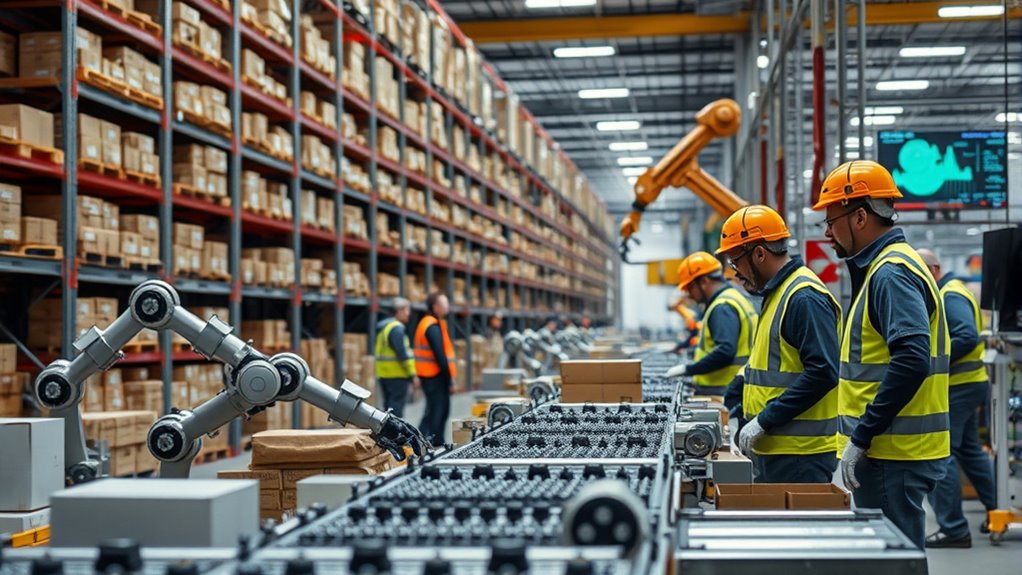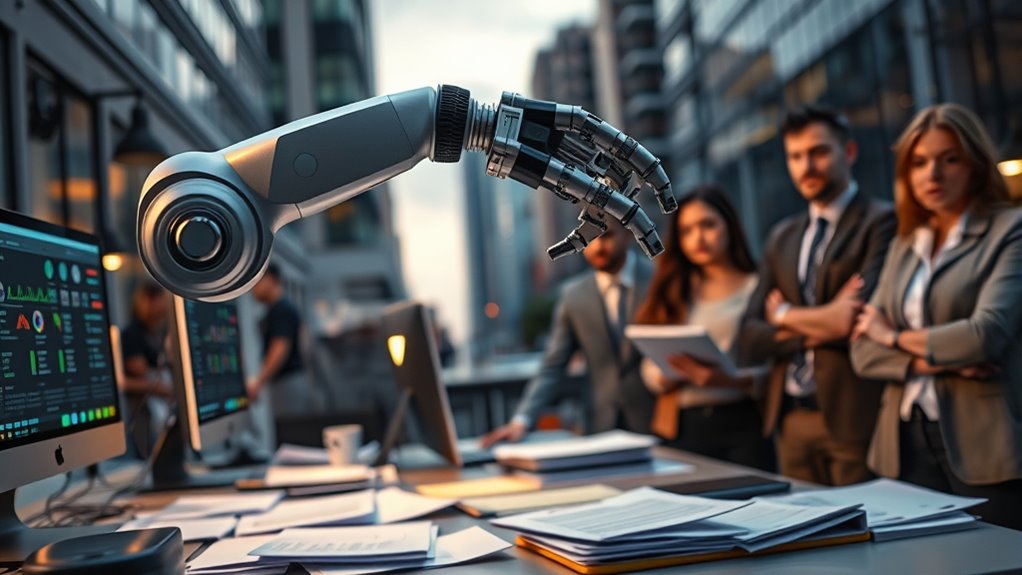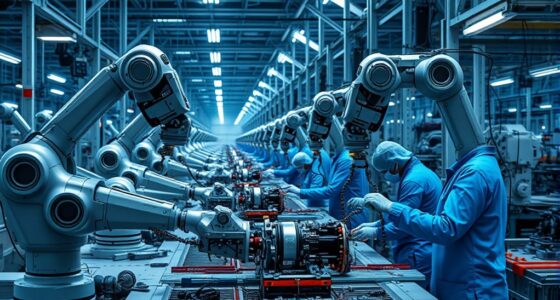AI is changing many careers by automating routine tasks and boosting efficiency. Professions like accountants, legal assistants, content creators, HR specialists, IT support, customer reps, data analysts, manufacturing workers, and real estate agents face significant shifts—they may see automation impact some tasks or roles. However, many jobs will evolve, requiring new skills and strategic thinking. To understand how AI might affect your work and what you can do, keep exploring these trends further.
Key Takeaways
- Routine and repetitive tasks across professions like data entry, legal research, and content creation are most susceptible to AI automation.
- Roles requiring high emotional intelligence, creativity, or nuanced judgment, such as human-centered counseling or storytelling, are less at risk.
- AI enhances productivity and creates new opportunities, but some entry-level positions may decline due to automation efficiencies.
- Professions with complex decision-making and interpersonal skills, like HR and customer service, will see shifts but not complete job loss.
- Continuous upskilling in AI literacy and complementary skills is essential to remain relevant amid technological advancements.
Financial Analysts and Accountants

Have you ever wondered how AI is transforming the role of financial analysts and accountants? AI adoption is growing rapidly, projected to increase by 30% annually from 2023. This growth is fueling a market expected to reach USD 37.60 billion by 2030. Many professionals see AI as a positive force, citing improvements in data accuracy and work quality. With AI, you’ll analyze financial data faster and more accurately, uncovering trends and making predictions in real time. AI enhances risk management by spotting anomalies and supporting strategic decisions. It automates routine tasks, increasing efficiency and freeing you for more complex work. As AI continues to evolve, you’ll need to adapt by upskilling, but the technology promises to create new opportunities rather than eliminate your role outright. 83% of accountants are aware of AI in their workplace, indicating widespread familiarity and acceptance of AI tools within the profession. Embracing technological advancements can help professionals stay competitive and leverage new tools effectively.
Junior Lawyers and Paralegals

AI is reshaping the roles of junior lawyers and paralegals by automating routine and repetitive tasks, which traditionally required significant manual effort. This automation boosts efficiency but reduces the demand for entry-level staff handling basic research, document review, and administrative duties. About 67% of corporate legal departments and 55% of law firms expect AI to impact staffing needs and business models. While some legal professionals feel prepared to adapt workflows and pricing, many juniors face displacement in administrative roles. AI tools now assist with legal research, contract analysis, and document review, shifting junior work toward higher-value tasks like client communication and strategic analysis. Despite projected growth in paralegal employment, recent job losses highlight how AI’s rise is transforming, and sometimes shrinking, entry-level opportunities in the legal field. The increasing automation of routine tasks is also prompting law firms to rethink traditional employment structures and invest in upskilling their existing teams. Additionally, the integration of advanced AI technology is prompting a reevaluation of skill requirements and ongoing training programs for legal professionals, particularly in areas related to remote collaboration. Recognizing the importance of specialized cybersecurity knowledge, legal professionals are increasingly required to understand how to protect sensitive information in digital workflows. Furthermore, the rapid advancement of artificial intelligence is accelerating the need for continuous learning and adaptation within the legal sector. The ongoing development of machine learning algorithms is expected to further influence how legal services are delivered and how professionals prepare for the future.
Content Creators and Journalists

As AI increasingly generates news articles and content, you may wonder how this impacts your creativity and the human touch in storytelling. While AI speeds up workflows and handles routine tasks, it also raises questions about maintaining authenticity and emotional connection. Balancing AI efficiency with genuine human insight becomes essential in shaping the future of journalism and content creation. Nearly 83% of surveyed creators incorporate AI in some form, highlighting how integral AI has become in modern storytelling workflows. Recognizing the importance of fatherly guidance and emotional depth in storytelling can help preserve authenticity amid technological advancements. Additionally, understanding how traditional bedroom decor influences personal expression underscores the value of human creativity in design and storytelling. Exploring the growing trend of eco-friendly travel demonstrates how sustainability can be seamlessly integrated into innovative content narratives.
AI-Generated Content Impact
The rise of AI-generated content is transforming the roles of content creators and journalists, streamlining tasks like drafting, ideation, and reporting. AI tools, driven by $33.9 billion in investments in 2025, now support 71% of content ideation and 68% of content development, improving efficiency. Marketers see a 36% boost in conversion rates with AI-generated content, but many also report declines in website traffic, highlighting challenges in audience engagement. Routine tasks like drafting are increasingly handled by AI, reducing entry-level jobs, especially for journalists and writers, while increasing demand for oversight and advanced skills. Human review remains essential to guarantee quality, combat misinformation, and maintain trust. As AI becomes integral, content creation evolves, blending automation with human expertise. Additionally, the integration of AI in content workflows is leading to new ethical considerations that organizations must address to ensure responsible use. The ongoing development of AI technology also raises questions about the future of employment in creative fields, emphasizing the need for skill adaptation and continuous learning. Understanding AI’s impact on employment helps stakeholders navigate the evolving landscape of work and technology integration. Moreover, fostering collaborative human-AI workflows can optimize productivity and uphold journalistic integrity. As organizations implement AI systems within their content strategies, they must also focus on building trust with audiences to prevent misinformation and preserve credibility. Given the rapid pace of AI advancements, continuous training and reskilling are vital for professionals to stay relevant in this shifting environment.
Creativity and Human Touch
Despite advances in automation, human creativity remains essential for producing original content that resonates emotionally and culturally. You bring personal voice, empathy, and cultural context that AI can’t fully replicate. Storytelling, ethical judgments, and nuanced reporting depend on human insight. Creative brainstorming and innovation are primarily driven by humans, helping content stand out in saturated markets. Additionally, understanding bank and finance contexts is vital for crafting relevant and trustworthy narratives. Moreover, the ability to adapt to mindfulness practices enables creators to foster authentic connections with their audience, which AI cannot easily emulate. Recognizing the importance of emotional intelligence enhances the ability to connect deeply with audiences and address complex human experiences. Furthermore, the vibrational aspect of energy and awareness plays a crucial role in maintaining authentic engagement and meaningful storytelling, ensuring content remains impactful. Additionally, the unique capacity for cultural nuance ensures that content remains sensitive and appropriate across diverse audiences.
Human Resources and Recruitment Specialists

You’ll notice that AI is transforming how HR and recruitment specialists work, especially with candidate screening and automating routine tasks. These changes mean you can focus more on strategic initiatives and building relationships rather than administrative duties. As a result, your skill set needs to evolve to stay effective in this AI-driven landscape. Additionally, staying informed about AI security vulnerabilities and safety measures is crucial to ensure responsible implementation of these technologies. Understanding home decor trends and their influence on workplace environments can also inspire innovative approaches to employee engagement and wellness programs within organizations. Furthermore, a solid grasp of contrast ratio in visual displays can enhance the effectiveness of presentations and training sessions, making information clearer and more engaging for employees. Monitoring entertainment support hours and how they adapt to seasonal and special event schedules can provide valuable insights into organizational planning and resource allocation.
AI in Candidate Screening
AI is transforming candidate screening by automating routine tasks like resume review and interview scheduling, allowing recruitment specialists to focus on strategic and interpersonal aspects of hiring. This boost in efficiency means you can evaluate more candidates faster, reducing time-to-hire by up to 40%. AI tools analyze vast datasets with higher accuracy, helping you identify the best-fit candidates while minimizing biases. They also personalize the candidate experience by providing timely feedback and tailored benefits, which can improve satisfaction and retention. Advanced language models like ChatGPT assess communication styles and soft skills, offering a more holistic view of candidates. With AI seamlessly integrated into applicant tracking systems, you gain data-driven insights that support fairer, more consistent decision-making, ultimately increasing productivity and fairness throughout the recruitment process. Additionally, understanding paint sprayer technology can help HR professionals better evaluate technical roles that require knowledge of such equipment, ensuring suitable candidate placement.
Automation of Recruitment Tasks
Automation of recruitment tasks streamlines your hiring process by handling routine activities like interview scheduling and candidate communication. This reduces manual effort and speeds up hiring. With AI, you can:
- Automate interview scheduling, saving around 36% of recruitment time.
- Keep candidates informed through automated updates, improving experience.
- Manage calendar coordination and real-time analytics effortlessly.
- Incorporating essential oils such as lavender oil can help reduce stress levels during busy recruitment periods. Recognizing how spiritual energy influences decision-making can further enhance your hiring approach, promoting a more intuitive and balanced process.
These tools cut down on repetitive tasks, freeing you to focus on strategic decisions. Nearly all hiring managers (99%) now use AI in some way, and 98% of recruiters see efficiency improvements. Automation not only accelerates hiring but also enhances data insights, helping you identify top candidates faster and reduce turnover risks. While automation handles routine work, the human touch remains essential for nuanced decision-making and relationship building.
Evolving HR Skill Needs
As workplace dynamics continue to evolve rapidly, HR professionals must develop new skills to stay effective and relevant. You need to align talent management with broader business goals by applying strategic thinking and proactive workforce planning. Using data-driven insights, you can forecast hiring needs, identify skill gaps, and optimize resource allocation for long-term growth. Embracing an agile mindset is essential; adaptability helps you respond quickly to changing employee expectations and labor market shifts. Strong communication and coaching skills enable you to build trust, guide organizational change, and develop talent effectively. Additionally, cultivating digital literacy and analytical competencies allows you to extract valuable insights from employee data. Finally, fostering cultural awareness and focusing on employee experience helps create inclusive, engaging workplaces that support retention and overall organizational success.
IT and Technical Support Roles

How is the landscape of IT and technical support roles changing in response to technological advancements? AI is automating many routine tasks, which impacts job stability but also creates new opportunities. Here’s what’s happening:
AI automates routine IT tasks, transforming roles and opening new high-skill opportunities in tech support.
- AI chatbots and virtual assistants handle common customer issues, reducing the need for human intervention.
- Routine IT tasks like troubleshooting and debugging are increasingly automated with AI tools.
- AI monitors networks and manages cybersecurity, potentially decreasing the demand for some specialized roles.
Despite these shifts, new AI-related jobs are emerging, requiring high-skill expertise. You’ll need to adapt by developing AI literacy, problem-solving skills, and staying current with evolving technologies. The future will likely involve managing and supporting AI systems rather than performing manual tasks.
Data Entry and Administrative Assistants

Advancements in AI are reshaping the role of data entry clerks and administrative assistants by automating many routine tasks they traditionally performed. AI can handle about 46% of administrative duties, notably reducing manual effort. This automation is expected to cut roughly 8 million data entry jobs worldwide over five years. Tasks like scheduling, email filtering, and document management are now streamlined by AI tools, boosting productivity.
| Task | Automation Impact |
|---|---|
| Data entry | 46% tasks automated |
| Scheduling | AI handles faster, better coordination |
| Email filtering | Automated sorting and responses |
| Document management | AI organizes and processes files |
| Routine reports | AI generates with minimal input |
You’ll need to shift from transactional work to roles involving emotional intelligence, problem-solving, and AI management skills.
Customer Service Representatives

AI is transforming the role of customer service representatives by automating routine tasks and enhancing overall efficiency. You’ll find that AI handles common inquiries quickly, freeing you to focus on complex issues. Here are three key impacts:
AI automates routine tasks, boosting efficiency and allowing reps to focus on complex, high-value customer issues.
- Increased productivity, allowing you to manage more inquiries per hour.
- Role redefinition, shifting your focus to high-value and emotionally demanding tasks.
- AI-assisted responses, reducing your effort and improving resolution times.
Customers now expect faster, personalized service, which AI provides by analyzing data and offering tailored interactions. With AI chatbots available 24/7, you can deliver continuous support, and your role will evolve from reactive problem solver to a more strategic, empathetic communicator. AI is shaping the future of customer service jobs, emphasizing skill development and emotional intelligence.
Market Researchers and Data Analysts

As AI becomes increasingly integrated into market research, nearly 90% of researchers now rely on AI-powered tools daily to analyze large datasets and uncover consumer insights. AI speeds up data analysis, automates report writing, and enhances pattern recognition, transforming your role from routine tasks to strategic focus. You’ll need to develop skills in AI and machine learning to stay relevant, as your responsibilities shift toward interpretation and strategy. Despite these changes, job security concerns persist due to potential task automation.
| Task | AI Impact |
|---|---|
| Data analysis | Faster, more accurate |
| Report writing | Automated, efficient |
| Pattern recognition | Identifies complex trends |
| Strategic roles | Growing importance |
Manufacturing and Warehouse Workers

AI is transforming manufacturing and warehouse operations by automating repetitive and physically demanding tasks, allowing you to focus on more complex activities. This shift enhances safety, productivity, and job quality. Consider these key impacts:
- AI improves efficiency with smart inventory management, route optimization, and predictive maintenance.
- Safety gets a boost as robots handle heavy lifting and repetitive motions, reducing injuries.
- Collaboration between humans and AI-driven robots makes workers 85% more productive.
While AI creates new opportunities, it also raises concerns about job displacement, with up to 20 million manufacturing jobs potentially at risk by 2030. Still, your role may evolve, emphasizing skills that complement AI’s capabilities.
Real Estate Agents and Property Managers

The real estate sector is experiencing a significant transformation as advanced AI tools streamline operations and enhance decision-making. As a real estate agent or property manager, AI helps you automate routine tasks, freeing up time for more strategic work. It can boost property inquiries by 200% through virtual staging and predict market trends with 90% accuracy, giving you a competitive edge. AI also improves customer satisfaction by offering personalized search experiences. For property managers, AI reduces tenant screening time by 75% and automates repetitive tasks, leading to operational savings of up to 15%. Nearly half of real estate businesses report cost reductions thanks to AI. Embracing these technologies is vital for staying relevant and competitive in an evolving industry driven by rapid technological growth.
Frequently Asked Questions
How Soon Might AI Fully Replace These Professions?
You’re wondering how soon AI might fully replace certain professions. Based on current trends, automation could impact roles like manufacturing and data entry as early as 2025. Administrative and customer support jobs face significant risks by 2028, with some tasks fully automated. However, full replacement varies by industry and job complexity, so stay adaptable. Preparing for continuous learning and skill development will help you stay ahead in this evolving job landscape.
What Skills Can Protect Workers From AI Displacement?
To protect yourself from AI displacement, focus on developing digital skills like data analysis, AI integration, and programming. Cultivate adaptability, creativity, and AI literacy to stay relevant as technology evolves. Learning new skills in fields like cybersecurity, AI ethics, and healthcare can open up opportunities. By continuously upgrading your expertise and embracing innovation, you position yourself to thrive amid AI-driven changes in the workplace.
Are There Any Jobs Within These Fields Safe From AI Automation?
You wonder whether your work within these fields stays safe from AI’s reach. The answer is a confident yes, especially in jobs demanding human connection, compassion, and creativity. Roles like healthcare providers, educators, cybersecurity specialists, and artists thrive because they rely on empathy, ethical judgment, and imaginative innovation. These professions are protected because AI struggles to replicate genuine human interaction, emotional understanding, and original artistry, making your work resilient against automation’s advance.
How Can Professionals Upskill to Stay Relevant in an Ai-Driven Market?
To stay relevant in an AI-driven market, you should focus on developing skills that AI can’t easily replicate, like creativity, critical thinking, and problem-solving. Embrace AI literacy to collaborate effectively with automation tools. Continuously learn new digital skills, enhance your data analysis abilities, and strengthen your communication and interpersonal skills. Industry-specific upskilling, online courses, and mentorship programs can also help you adapt and thrive in this evolving landscape.
Will AI Create More Jobs in These Sectors or Only Eliminate Them?
You might find it surprising that AI is expected to create about 97 million new jobs by 2025. While it does replace around 9 million jobs, it also opens opportunities in sectors like manufacturing, customer service, and logistics. Your job’s future depends on how well you adapt to new roles, develop skills in AI and data analysis, and stay flexible. Overall, AI’s impact will be a mix of job creation and displacement.
Conclusion
As you stand at the crossroads of technology and tradition, remember that AI is like a double-edged sword—cutting through tasks but also creating new opportunities. While some jobs may fade like footprints in the sand, others will emerge, requiring human touch and ingenuity. Embrace the change, sharpen your skills, and see yourself as a navigator steering through a sea of innovation. Your adaptability is the compass that will guide you to brighter horizons.









